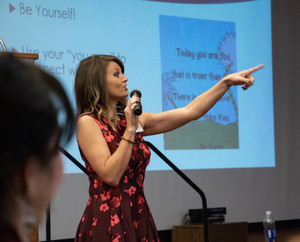Social Work conference promotes listening as suicide prevention tool

CHADRON – “Suicide: Starting the Conversation,” an all-day conference hosted by Chadron State College’s Social Work 435 class Nov. 7, featured talks about awareness and prevention by survivors of suicide and mental health professionals.
The annual conference, started by faculty member Bruce Hoem in 2008, has included topics such as veteran’s awareness, disabilities, civility, post-traumatic stress disorder, and cancer awareness.
This year’s class had 11 students: Jessy Bale of Hermosa, S.D., Maaryn Davis of Chadron, Betsy Goodell of Chadron, Justin Hartman of Valentine, Neb., Rachel Johnson of Rushville, Neb., Lauren Newman of Julesburg, Colo., Jazmin Perez of Worland, Wyo., Kassandra Perez of Scottsbluff, Neb., Danea Ray of Chadron, Holli Turek of Le Center, Minn., and Hannah Wharton of Ketchikan, Alaska.
The speakers included Shardel and Mark Nelson, Amy Carnahan, a service coordinator at Western Community Health Resources, Dennis Gillan, a survivor and professional speaker, Heather Williams, a mental health and suicide prevention advocate, and Chadron Police Chief Tim Lordino.
Shardel Nelson, whose daughter Kaelia was lost to suicide in 2017, said Kaelia placed high expectations on herself.
“Kaelia felt she was disappointing us, but that was not the case. She was accomplished in so many ways. But cognitive distortions prevented her from seeing that or feeling like she was good enough,” Nelson said.
Kaelia wrote about the cognitive distortions she experienced in a children’s book she wrote for a class when she was a student at Peru State College. Although “What’s Happening to my Mind?” explains that counseling and medication can help improve the situation, Nelson said her daughter, for various reasons, had discontinued counseling and medication before her death.
Nelson said when she received Question Persuade Refer (QPR) training at the school where she works, she realized there were tools and techniques she could have used to communicate more effectively with her daughter.
“There is hope and there is help,” Nelson said.
Nelson and her husband, Mark, have been active in the “Stomping the Stigma: Creating Conversations about Mental Illness” campaign.
Carnahan said the free QPR class is being offered to the faculty and staff of Chadron Public Schools.
“Those who complete suicide are unable to find solutions to their feelings of hopelessness and want to end the unbearable pain. Be present in the lives of those who struggle with mental illness again and again. Validate their pain and provide resources,” Carnahan said.
Carnahan listed risk factors such as sleeping too much or too little, saying goodbye, aggression and fatigue. Multiple risk factors including chronic pain, traumatic brain injury, rejection in any form, and exposure to the suicide of another, increase the chance of suicide. She said the U.S. is facing an epidemic of suicide with 20 veterans dying each day from suicide. It is the leading cause of death for children ages 10-14 in Nebraska and the second most common cause of death for Nebraska residents 15-34, according to Carnahan.
She said protective factors such as strong problem solving skills, spirituality, a peer support system and healthy coping skills, can lower the possibility of suicide, especially when combined.
Gillan, certified by the QPR Institute, also shared suggestions for healthy coping with stress.
“Get enough sleep. Sleep in a cold, dark room with white noise, if possible. Take a break from drinking. If you’re handling something big, do it sober,” said Gillan, who said his sobriety began as a time out from drinking following the suicide of his brother. “A stick alone can be broken by a child. A bundle cannot be broken. Bundle up.”
Gillan reiterated the value of listening to those with suicidal thoughts.
“People ask me if I ever talked anyone out of suicide when I was a suicide help line volunteer. I say I listened someone out of suicide,” Gillan said.
He shared the text and phone numbers for suicide prevention: 741741 and 800-273-TALK.
Williams, co-founder of listeningsaveslives.net, told the story of an officer who convinced a person not to jump from the Golden Gate Bridge. In 86 minutes, the officer spoke only three minutes, she said.
“That officer has developed a conversation starter for situations involving potential suicide. He says, ‘Looks like you’re having a bad day.’ This simple technique has allowed him to start lengthy dialogues which have led to successful resolution,” Williams said.
As a college student, Williams was able to convince her professors to include QPR in the psychology curriculum.
“Every one of us is needed. Anyone can save a life. Never underestimate the small things. This conference started as a conversation,” Williams said.
The conference included “Suicide: The Ripple Effect,” a documentary featuring Kevin Hines’ survival after jumping off the Golden Gate Bridge. It will be shown again Monday, Nov. 26, at 6:30 p.m. in The Hub.
The day concluded with a panel discussion moderated by Chadron Public Schools Superintendent Dr. Caroline Winchester.
Category: Campus News, Social Work




